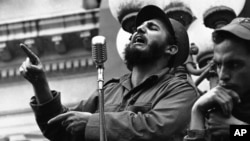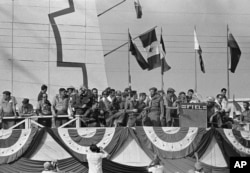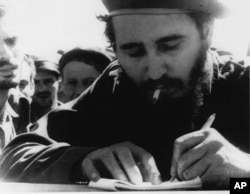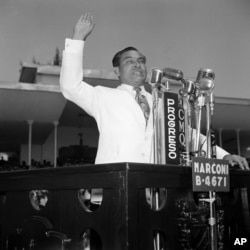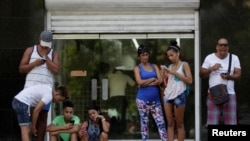Fifty-six years ago today, Cuban revolutionary leader Fidel Castro banned multiparty elections and declared Cuba a socialist nation.
Addressing hundreds of thousands of Cubans at a May Day parade (read his speech in English here), Castro openly identified himself as a Marxist-Leninist, setting off a decades-long Cold War with the United States.
"If Mr Kennedy does not like socialism, we do not like imperialism," Castro said, referring to then-president John F. Kennedy. "We do not like capitalism."
The May Day proclamation came just one month after the failed U.S.-sponsored invasion of the island by Cuban exiles, the so-called Bay of Pigs operation.
The invasion force of 1,300 men landed at Bahia de Cochinos, but was quickly crushed. The days that followed saw thousands of anti-Castro rebels confined in makeshift prisons; hundreds were later executed.
Castro came to power in 1959 after leading a successful revolt against dictator Fulgencio Batista and his government.
From the start, the United States worried that Castro was too leftist in his politics. He implemented agrarian reform, expropriated foreign oil company holdings, and eventually seized all foreign-owned property in Cuba.
He also established close diplomatic relations with the Soviet Union, and the Russians were soon providing economic and military aid to the Caribbean nation.
By January 1961, the United States had severed diplomatic relations with Cuba.
Decades later in 2014 (long after the dissolution of the former Soviet Union), former U.S. President Barack Obama restored full diplomatic relations with Cuba. The U.S. opened an embassy in Havana for the first time in more than a half-century as Obama vowed to "cut loose the shackles of the past" and sweep aside one of the last vestiges of the Cold War.
The historic deal broke an enduring stalemate between the two countries, divided by 144 kilometers of water and decades of mistrust and hostility dating from the days of Theodore Roosevelt’s charge up San Juan Hill during the Spanish American War that brought independence to Cuba.
The visit by Obama in 2016 was aimed at cementing the new relationship between Washington and Havana. Some years before, in 2008, an aging and unwell Fidel Castro officially stepped down, handing power to his brother, Raul.
Fidel Castro died Nov. 25, 2016, at age 90.




